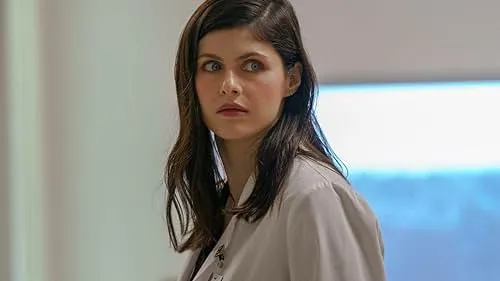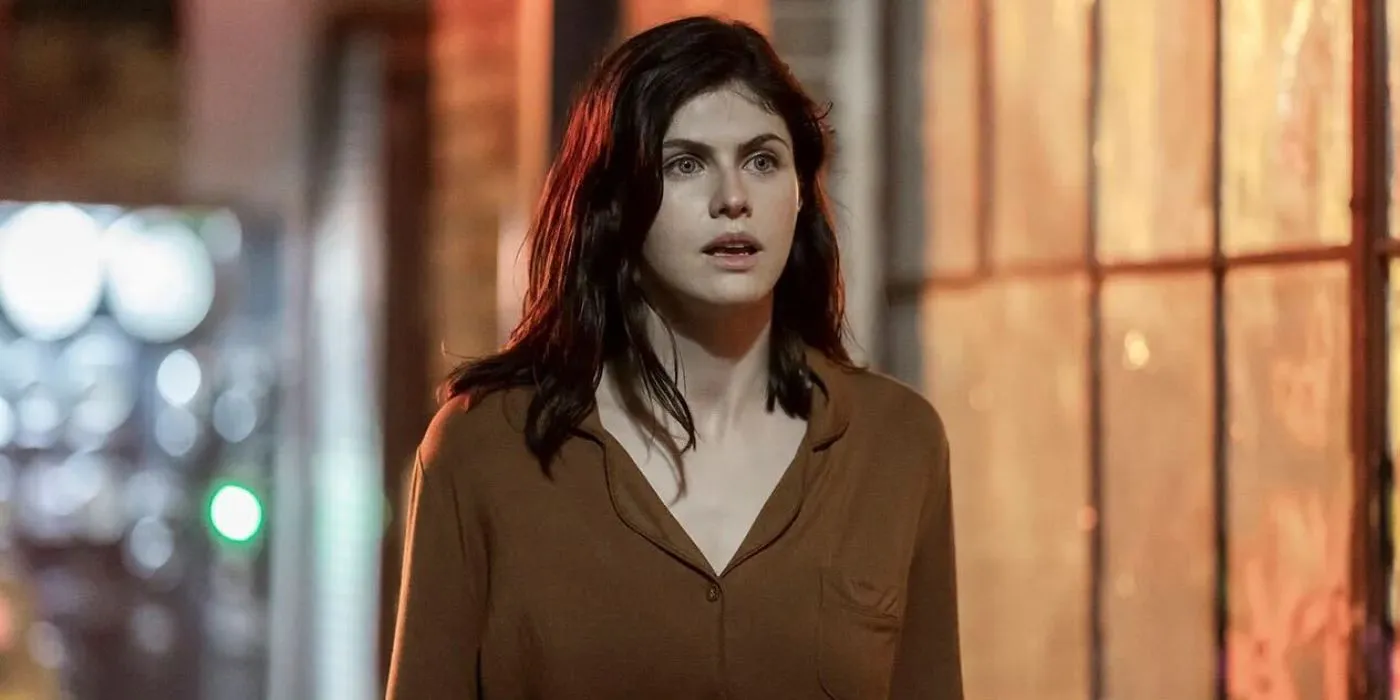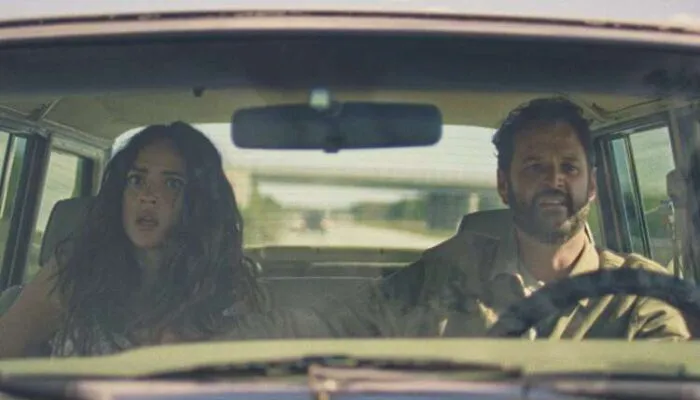

Inground: Alexandra Daddario Faces the Horror That Lives Within — A Slow Descent Into Suburban Madness
The upcoming film Inground, starring Alexandra Daddario and John Cho, is already generating buzz as one of the most intriguing horror-thrillers on the horizon. But beneath its surface-level plot — a divorced father building a swimming pool to reconnect with his son — lies a chilling metaphor for emotional decay, repressed trauma, and the dark psychological currents that run through modern family life.
Directed by Aaron Katz and penned by Dan Dworkin, known for his work on American Horror Story, Inground is shaping up to be more than just a scare-fest. With a tone reminiscent of Hereditary and The Babadook, this film might deliver something deeper: a reflection of the horrors we bury beneath the surface, both literally and emotionally.

A Pool Becomes a Portal to the Unspoken
The central image of the film — a man digging a pool to reconnect with his child — is deceptively mundane. But in the hands of Aaron Katz, it transforms into a psychological device. The swimming pool, rather than being a symbol of relaxation or family fun, becomes a metaphor for the emotional hole left by divorce, failure, and alienation.
The father, played by John Cho, isn’t just digging through soil. He’s excavating guilt, memories, and repressed fears. Every shovel of dirt is a piece of his broken past. And as the pool begins to take shape, it also begins to unleash something sinister — not just in the yard, but within himself and his relationship with his son.
This symbolic use of environment echoes the power of films like The Shining, where location becomes character. In Inground, the suburban backyard — usually a haven of safety — becomes a battleground for emotional reckoning and potentially supernatural horror.
Alexandra Daddario’s Role: A Catalyst for Psychological Chaos?
While much of the early synopsis focuses on the father-son dynamic, the presence of Alexandra Daddario adds a critical new layer to the story. Daddario has made a name for herself in emotionally complex and often eerie roles — from Mayfair Witches to The White Lotus. In Inground, her casting suggests a character who may either anchor or unbalance the narrative.
Though her role remains undisclosed, her track record hints at someone emotionally intelligent, possibly hiding secrets of her own. She may play a neighbor who becomes entangled in the horror, or perhaps a character from the father’s past whose reappearance coincides with the pool’s construction. Either way, Daddario’s character could act as the external manifestation of the internal conflict — drawing connections between memory, guilt, and unresolved trauma.
A Story Rooted in Real-Life Fears
Inground taps into some of the most real and relatable human experiences — the fear of parental failure, the trauma of divorce, and the desperation to reconnect with loved ones after emotional damage has been done.
At its core, the story isn’t about ghosts or monsters — it’s about the emotional residue of broken relationships. That emotional truth is what may make the horror hit even harder. Viewers may find themselves identifying with the characters before they’re frightened by them, which often leads to more resonant fear.
The fact that the horror is centered around a seemingly wholesome act — building a pool for a child — only makes the descent into darkness more jarring. When the safe becomes unsafe, the familiar becomes foreign, and the protective becomes destructive, horror feels personal.
John Cho as the Modern Horror Everyman
John Cho has proven time and again that he can carry a film that hinges on internal struggle. In Searching, he portrayed a father desperately hunting for his missing daughter — a performance driven not just by urgency, but by emotion. In Inground, he returns to the theme of fatherhood, but from a different angle: one where he’s not searching outwardly, but inwardly.
As a recently divorced man trying to reestablish a connection with his son, Cho’s character may be riddled with guilt, regret, and the fear of being permanently disconnected. This internal chaos is fertile ground for horror, especially when combined with the physical manifestation of digging — literally unearthing buried emotions.
Production Team Brings Gravitas to Genre
The pedigree behind Inground raises expectations considerably. The film is produced by Scott Free Productions, founded by legendary director Ridley Scott, who changed the horror-sci-fi genre with Alien. With Michael Pruss and Sam Roston also producing, the film is in experienced hands.
Additional production support comes from Gramercy Park, with Joshua Harris and Nathan Klingher overseeing financing. Executive producers Michael Rothstein, Samuel Hall, Warren Goz, Mark Fasano, and Ford Corbett round out a team that suggests Inground is being treated as more than just a mid-tier horror film. This is a project with festival aspirations, critical expectations, and likely streaming potential once released.

The Influence of Elevated Horror and Indie Suspense
What makes Inground so appealing to horror fans and film critics alike is its embrace of the “elevated horror” trend — stories that use horror elements to explore deeper emotional or philosophical questions.
Films like The Witch, It Comes At Night, and The Night House have proven that horror doesn’t have to be loud to be terrifying. Often, quiet horror lingers longer. It gets under your skin, into your thoughts, and forces you to confront fears you didn’t even know you had.
Aaron Katz, with his indie sensibilities and focus on atmospheric tension, seems primed to follow in the footsteps of directors like Ari Aster and Jennifer Kent. If he succeeds, Inground may not just be a good horror movie — it may become a case study in modern psychological suspense.
The Title “Inground” as a Reflection of Themes
Even the title — Inground — is loaded with symbolism. On the surface, it refers to the in-ground pool that serves as the central object in the film. But on a thematic level, it may hint at the emotional states of the characters: stuck, buried, sunken, or even decomposing under the weight of their past.
It’s a title that suggests stillness — something that’s been placed beneath the earth, hidden, or forgotten. Whether it’s trauma, secrets, or even something supernatural, Inground challenges the audience to ask: What have we buried — and what happens when it tries to come back up?
Final Thoughts: Inground Could Redefine 2026 Horror
While production is set to begin in March 2026, the anticipation already surrounding Inground points toward a film that could leave a lasting mark. It might not be a box-office blockbuster, but it doesn’t need to be. Films like The Witch and The Babadook proved that horror grounded in emotion and metaphor can become modern classics.
With Alexandra Daddario and John Cho leading the cast, a carefully constructed script by Dan Dworkin, and the artistic vision of Aaron Katz, Inground is more than a film about a backyard pool. It’s about the unseen horrors we build into our lives — the trauma we try to bury, the relationships we dig through, and the emotions that refuse to stay hidden.
If you’re expecting blood and gore, Inground may not be the film for you. But if you’re ready for a psychological descent into grief, fear, and fragile human connections — this is the one to watch.
Get ready to go deep. Very deep.


















